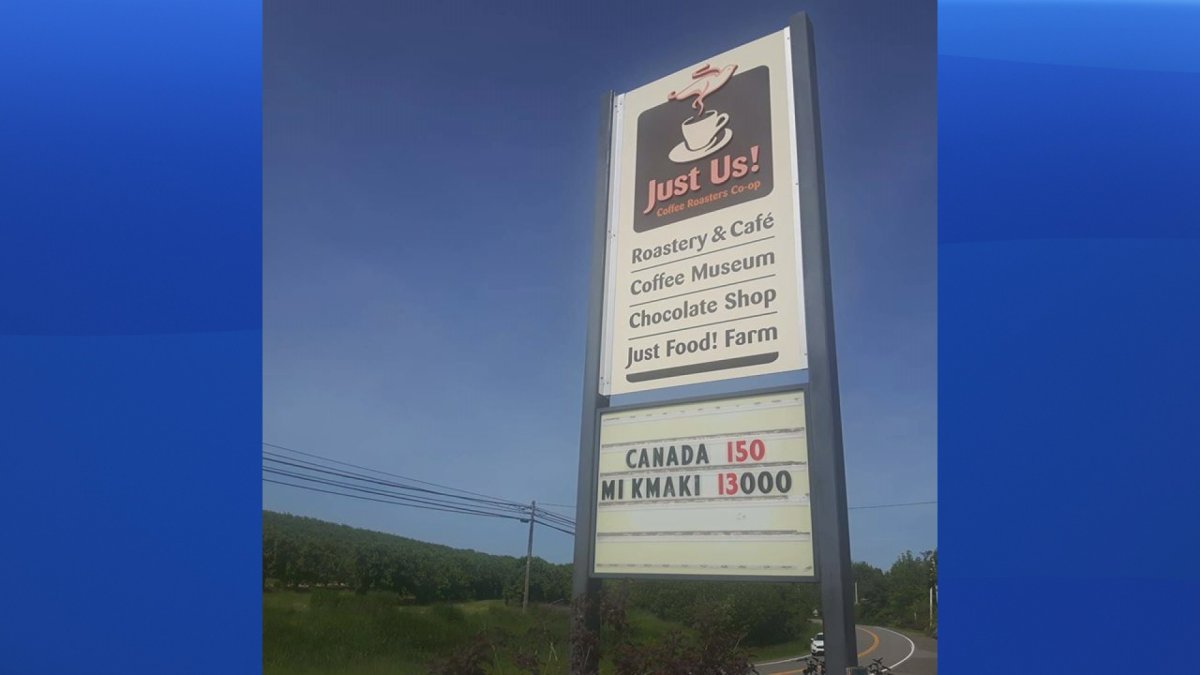Nova Scotia business Just Us! Coffee Roasters Co-op is celebrating Canada’s 150th birthday in an alternative way that’s going even further back in time than the Canadian Confederation.

Earlier this week a new message appeared on the business’ roadside sign in Grand-Pré, N.S. In addition to reading “CANADA 150”, the message also reads “MI KMAKI 13,000”.
According to the Nova Scotia Archives, the number dates back to when archeological evidence shows a group of hunters and gatherers occupied central Nova Scotia at the time, who Mi’kmaw elders say were the earliest settlers of the Mi’kma’ki territory.
READ MORE: Canada at 150: Many indigenous people see little reason to celebrate
Joey Pittoello, general manager at Just Us!, told Global News putting up the message is to communicate more than just Canada’s birthday.
“It’s not meant to be anti-Canadian at all, it’s just meant to acknowledge all the special and important pieces of this really incredible nation of ours,” Pittoello said. “I think there’s some black marks that we need to look at and the sign was meant to start a conversation.”
The message for the sign was pitched by agronomist Av Singh, both a volunteer and occasional consultant with the co-op.
In a phone interview, Singh couldn’t pinpoint where he got the specific number to pitch for the message, but he pitched the idea because it fell within what Just Us! tries to communicate.
“As a company we’re very committed at understanding indigenous rights and valuing the fact that we’re all treaty people here and we need to respect that,” Singh said.
READ MORE: Heritage Day 2017 celebrates Nova Scotia Mi’kmaq culture, heritage
For the nearby Glooscap First Nation, some people say they’re hearing several positive reactions to Just Us! Coffee’s decision to post the message on their sign.
Amanda Peters, chief executive officer for Glooscap Ventures — Glooscap’s independent economic development arm of the reserve, said the sign going up is starting a conversation.
“Everybody’s very excited about Canada 150 when actually there have been people here for a lot longer,” Peters said.
She said Glooscap has had a good relationship with Just Us, with them accepting Status cards, visit their community garden and “they acknowledge they are on unceded Mi’kmaw territory every time they have the opportunity.”
No one from the co-op approached the community about putting up the message, Peters said, and it was a nice surprise when she went in for coffee a few days ago. She said it also started making its way around social media.
If people drive by the sign and wonder what it means, Peters said she hopes people take away that there have been people here longer than the Canadian Confederation.
- Freeland set to table 2024 federal budget in the House of Commons
- All a-boot tradition: A look at finance ministers’ budget shoes through the years
- Inflation ticked higher in March. Are Bank of Canada rate cuts still in the cards?
- Food service strike: Air Canada, WestJet refine menus at Toronto Pearson
READ MORE: Halifax classrooms could acknowledge Mi’kmaq land in daily announcements
“Those people count and those people need to be heard and listened to as well and should be celebrated,” Peters said. “Why don’t we have a Mi’kma’ki 13,000?”
Rebecca Thomas, Halifax’s Mi’kmaq Poet Laureate, said the sign provides a “duality” to Canadian history.
“There’s not just one history, there’s multiple histories simultaneously and I think it’s really kind of a significant thing for them to acknowledge, ‘hey it’s both of these things at the same time,’ and I think it’s a really important thing that they’re doing,” Thomas said. “I also think it’s a bit of a subversion of the Canada 150 narrative, maybe that’s just my interpretation of it but I just enjoy that as well.”
Thomas said it’s a subversion because she finds the Canada 150 is the promotion of “this is Canada’s history” and having a sign like what Just Us! Coffee has challenges that narrative.
The 31-year-old aboriginal poet laureate said the sign is a “small act of resistance” and helps normalize indigenous presence in indigenous lands.
“So much of this stuff is a ‘special’ thing done for indigenous people as like an exception, but when you think about it this has always been indigenous territory so it shouldn’t be an exceptional piece when you see something like that come out, it should be very normal,” Thomas said.
Asked what he would like people to take away from seeing the message, Pittoello said it should provoke a question.
“Are there issues in our great country that we haven’t dealt with well and are we acknowledging all the special aspects and heritages within our country,” he said. “As settlers we need to start that conversation with the original inhabitants of this country and it won’t be until we know those people, in person, that we’ll actually be able to make those changes.”
RELATED: Build your own Canadian Coat of Arms




Comments